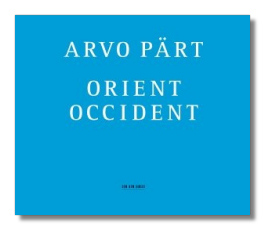
The Internet's Premier Classical Music Source
Related Links
- Pärt Reviews
- Latest Reviews
- More Reviews
-
By Composer
-
Collections
DVD & Blu-ray
Books
Concert Reviews
Articles/Interviews
Software
Audio
Search Amazon
Recommended Links
Site News
 CD Review
CD Review
Arvo Pärt

Orient & Occident
- Wallfahrtslied (Pilgrims' Song)
- Orient & Occident
- Como Cierva Sedienta
Helena Olsson, soprano
Swedish Symphony Orchestra & Choir/Tōnu Kaljuste
ECM New Series 1795 472080-2 DDD 47:29
This CD is like a simple but exquisite meal in three courses. It won't bulk you up, but it will give you something good to chew on.
Estonian composer Arvo Pärt has had an association with ECM New Series since the 1980s. In fact, Pärt's music was one of the reasons why producer Manfred Eicher created the label in the first place. Now it is 2002, and this is the tenth Pärt release from ECM New Series.
The Wallfahrtslied is a setting of Psalm 121, the one that begins, "I will lift up mine eyes unto the hills." Pärt wrote this nine-minute work in 1984 following the death of his friend Grigori Kromanov, a stage and film director. The original scoring was for male voice and string quartet, but Pärt arranged it for male chorus and string orchestra in 2001, and it is that version which has been recorded here. The strings darkly rock back and forth in a kind of funereal lullaby, and the men chant the text on a single pitch. For Pärt, the contrast between the dynamism of the strings and the fixedness of the voices mirrored "the invisible rift" that death had opened between him – still living in time – and Kromanov, who now existed outside of time. Taken as a whole, the Wallfahrtslied bridges that invisible rift.
Orient & Occident was composed in 2000 for Saulus Sondeckis and the Lithuanian Chamber Orchestra. This is a short work – barely seven minutes in length - for string orchestra. In the words of the composer's wife, Nora Pärt, "tiny contrasting musical segments – orientally tinted monody and chordal density – converge yet produce a gently flowing stream of music." In other words, East meets West. Pretty neat. By the work's end, the two styles have peacefully assimilated each other.
More psalms – specifically, Psalms 41 and 42 – serve as the text of Como Cierva Sedienta, better known in English as "As the hart panteth after the water brooks." Composed in 1998, it was premièred a year later at a music festival in Tenerife, which explains why Pärt chose to set a Spanish text. These psalms speak of the soul's quest for (and struggle with) God in times of adversity. Pärt's setting for women's choir, soprano, and orchestra goes beyond the mere juxtaposition of dynamic contrasts to produce drama – one of Pärt's favorite devices - and makes a more direct play for the listeners' emotions. As such, it is somewhat uncharacteristic of the composer. In a "blind test," I'd be unlikely to identify it as the work of Pärt. It's fine music, though. The vocal line, like St. Anthony, passes through alternately alluring and threatening orchestral "temptations" to find salvation.
The Swedish musicians bring an emotionally cool, straight purity to this music; it suits Pärt well. The recording was made in the Berwald Hall of Swedish Radio, and the warmth of the sound itself beautifully complements the music's coolness.
Copyright © 2002, Raymond Tuttle




















